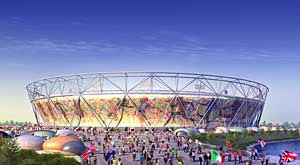 Last Sunday I was working at the High Heelathon event in Leeds in aid of Breast Cancer Haven. I became involved in this as the company I have been doing a work experience placement at, were responsible for the PR and design for it. I wanted to write a post about this, as having worked on the project from the concept to the final event I have found it very inspirational.
Last Sunday I was working at the High Heelathon event in Leeds in aid of Breast Cancer Haven. I became involved in this as the company I have been doing a work experience placement at, were responsible for the PR and design for it. I wanted to write a post about this, as having worked on the project from the concept to the final event I have found it very inspirational. Leeds High Heelathon was the UK's first high heel race, with Kimberley Walsh from girls aloud starting and leading the race. The route was around clarence dock and brewery wharf, a total of 1.2 miles. The idea of a high heel race to raise money for breast cancer haven is exciting and very appropriate. The pink, glamorous branding created a very strong identity for the event and looked great on the final day on the banners and t-shirts. If I hadn't known about the event they would have definitely caught my attention. Using Kimberly Walsh also created much more publicity for the race whilst the male participants in high heels added much comical value. One of the aims for the heelathon was to involve men as well and not just aim it at women, and this worked really well.
The race was sponsored by Moda In Pelle, who provided goody bags for each participant, including Scholl foot pads - very fitting for those who had just walked a mile in high heels. It is a good example of how important attention to detail is. Particularly useful to me was being able to see the development from start to finish, and everything that goes into producing a successful marketing campaign. What I thought was most effective about the High Heelathon, was that it took a generic idea for a fundraising event like a race and by thinking outside the box, an interesting, witty and original twist was added. I think that when holding charity events such as this one, it is very important to generate a new and fun concept for it to draw attention and publicity, as we often see the same ideas being used.






 visited London Fashion Week's exhibition at the Sommerset House and 180 Strand, showcasing two hundred of fashions most creative UK and international brands. The exhibition was intended to mirror the energy of the catwalk, helping to highlight fashion trends, and product selection and positioning. The exhibition was so visually eye-catching, consisting of vibrant, innovative and diverse collections. Features I particularly liked were the floating T-shirt island, that celebrates the T-shirt as a clothing item.
visited London Fashion Week's exhibition at the Sommerset House and 180 Strand, showcasing two hundred of fashions most creative UK and international brands. The exhibition was intended to mirror the energy of the catwalk, helping to highlight fashion trends, and product selection and positioning. The exhibition was so visually eye-catching, consisting of vibrant, innovative and diverse collections. Features I particularly liked were the floating T-shirt island, that celebrates the T-shirt as a clothing item.  initiative. A collection of twenty eight designers, that practice fairtrade, recycling and ethical issues in their creations. This was particularly interesting to see cutting edge fashion can still be made in an eco-sustainable way, with the industry making positive development towards these issues. I think it is very important that well known and high fashion brands lead the way with these issues for others to follow.
initiative. A collection of twenty eight designers, that practice fairtrade, recycling and ethical issues in their creations. This was particularly interesting to see cutting edge fashion can still be made in an eco-sustainable way, with the industry making positive development towards these issues. I think it is very important that well known and high fashion brands lead the way with these issues for others to follow. 



































